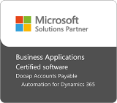
Finance teams mostly focus their development efforts on the tasks and processes they themselves spend most time on. These tasks are being automated and many are now beginning to be performed by software robotics.
Frequently, efficiency in the finance department is achieved by transferring work to the business units. When companies perform efficiency calculations, the time spent on financial management tasks outside the finance team is rarely considered, even if the cost related to this may be significant.
If the time spent on financial management tasks outside of the finance team were taken into a cost analysis, we would get a more realistic picture of the true efficiency of financial processes, as well as how much they burden an organization. Through analysis such as this, we would notice that significant savings could be achieved by reducing the time spent on finance tasks outside the finance team.
Imagine a typical mid-size company where two Accounts Payable employees handle 4000 monthly purchase invoices. In this organization, 300 people participate in reviewing and approving the invoices. If the organization uses 10 minutes to handle each purchase invoice (5 minutes to review and 5 minutes to approve), this would amount to work of 4 FTEs (full time equivalent). This is twice as many FTEs as within the AP team.
If we could reduce the time used to review and approve an invoice by 20%, the time saving would be nearly one FTE. If the same efficiency improvement is done within the AP team, it corresponds to 0.4 FTE. So, the conclusion is that we should focus on better efficiency of the tasks performed outside the finance team. How can this be done?
The key idea is to transfer as much of the work to the AP team as possible, i.e. centralize work. Why? Centralized processing enables mass handling, which is always more efficient than handling single transactions (among other things because getting started always takes time).
Centralized processing helps to effectively identify repetitive and recurring events which can then be automatized. If an approver receives one or just a few invoices a month to handle, he/she does not see the need to improve the efficiency of handling them. When the AP team handles twenty invoices of a similar nature per month, there is a clear benefit in improving the handling of these invoices.
“Coding invoices and handling taxes are worth centralizing to the finance team. This is where the experts reside and are trained and experienced in bookkeeping and taxation.
If coding or related jobs are tasked to the organization, it usually results in the finance team controlling and correcting the coding. The same job is thus performed twice. It is not useful to teach difficult bookkeeping or sales tax rules to the organization, because these are not their core tasks. Coding purchase invoices in the approval workflow can be a burdensome work phase if invoice reviewers across the organization are performing it.
Employees usually experience invoice coding as a difficult and boring administrative task which they perform only under pressure, when the due date of the invoice is approaching. Often, the choice of the account is based on a guess or the (possibly wrong) coding of the previous equivalent invoice. When coding is centralized to the finance administration, the cumulative time spent on coding is reduced, the quality of bookkeeping improved and the processing time of invoices is cut down.
Surprisingly many finance professionals believe business unit managers must code their purchase invoices, because only they know on which account the cost has been budgeted, and incurred costs cannot otherwise be matched against the budget. I would question whether this really is a means to collect useful cost information into bookkeeping from the company or group perspective.
Some finance professionals believe that business unit leaders should code their own invoices because otherwise they cannot budget their costs correctly for the next fiscal year to the correct account group. I would say that this is an expensive way to teach and guide budgeting.
“An organization’s time spent on purchase invoice management should be minimized.
The number of invoices requiring approval can be greatly reduced by matching them against POs and contracts. This guarantees that one can really concentrate on the invoices in the workflow. If the approver has 200 invoices waiting to be approved, it is certain that he/she cannot drill into the content of every invoice. I often hear a comment that an invoice must be routed to the reviewer and the approver so that they are informed of the cost (even though there are no discrepancies in the invoice).
For example, telephone bills are being routed in many organizations to every unit leader so that each of them is informed of the amount of telephone costs booked on their cost center, or so that he/she can control the phone costs of the employees. Processing the phone bill like this becomes truly expensive, and the company will probably incur late payment costs, because the approval process takes such a long time.
A better process instead of handling every single invoice would be to directly approve the invoice to be paid, make sure that each unit is informed with their cost report so they can then ensure phone costs per employee stay within agreed limits.
These same principles are worth applying in other processes, too. When you consider your next development goals in financial management, stop sub-optimization and focus on the total costs of processes. Centralizing administrative work into administration frees the organization to focus on business and improves how the organization experiences financial management as a service function.
Want to make your invoice handling fast and easy?
Get to know our invoice automation solution, it's called Dooap.








